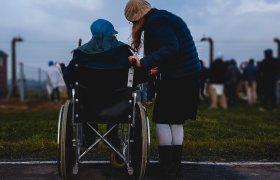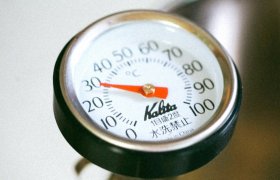Early Signs of Eating Disorders in Teenagers

Years ago no one was really familiar with eating disorders in teenagers. People were also more weight conscious until the turn of the 21st century. There were many teenage girls that hid the fact that they binged and purged their food. Some took many laxatives as well. The push was to be stick thin and young girls reached puberty and their bodies changed. Many girls were larger than their ancestors because there were more fast food places springing up, and more hormones in our food. The disorder became so rampant that young women began to have heart problems and started to die. The constant starvation of their bodies and the many laxatives took a huge toll on their internal organs. Anorexia was discovered and is a condition where teens think they are fat and starve themselves and become extremely weak and end up passing out. Bulimia, on the other hand, is another eating disorder where teens eat and throw up the food before it has a chance to digest. Teens may eat all day long for days and keep running to the bathroom and toss their cookies on an hourly basis. The laxatives come into the picture as well because teens believe that they are bloated and need to expel their food any way they can.
Parents will notice serious changes in their teens eating habits and should realize that these habits lead to possible life-threatening health issues. There are three types that the professionals know cause life-threatening issues with teens.
- Anorexia is a disorder where the teen refuses to eat enough food because they have a huge fear of being fat.
- Bulimia is a disorder where the teen binges by overeating and then will purge by vomiting and /or using laxatives to assist the food to pass quicker
- Binge eating is a disorder where the teen just binges on food for comfort but doesn’t vomit or use laxatives.
Eating disorders can carry from childhood into adolescence and some kids will be anorexic for a while and then switch to bulimia. These disorders start to occur during the teen years and sometimes they do start earlier. Girls are more prone to eating disorders than boys. Girls tend to sway more towards anorexia, while boys might be more into binge eating.
What’s the cause of these disorders?
Professionals don’t really have an answer to what causes these eating disorders. Some believe that there might be a combination of social, genetic and behavioral issues that might be the culprit. Too many teens are influenced by pictures of thin bodies on social media saying subliminally telling them that healthy is skinny. There are other factors as well that teens have issues with which include fear of becoming fat, stress, feeling helpless and low self-esteem.
Teens and kids cope with their problems by not eating healthy and using dangerous eating habits. Most kids suffer from other disorders as well and eating disorders is the frosting on the cake. Some of these disorders are anxiety, depression and substance issues.
The Dangers of Eating problems
As mentioned before eating issues in teens and kids start to cause physical problems and can even cause death. If you suspect your child has an eating disorder from noticing rapid weight loss or binge eating and laxatives laying around, call their doctor right away. Kids and teens can’t just wake up one day and the problem is gone, these kids need help to gain their weight back and learn healthy eating habits. Sometimes treatment is the best idea because the professional can find out exactly what is going on in that mind of your child’s.
 Anorexia
Anorexia
Kids that suffer from anorexia are looking in the mirror and not seeing themselves in a clear light. They are looking at their bodies with a distorted view. These kids believe they are overweight, even though they are terribly thin. These kids become obsessed with their weight and can exercise for hours because they feel even a small amount of weight isn’t normal for them. Many of these girls will not admit that they have suffered from anorexia at one time or another in their lifetime.
Symptoms
The symptoms of anorexia are anxiety, depression, type A personality and being very critical of themselves. These kids are constantly dieting even when they are dangerously thin. The excessive exercise starts because of their fear of being fat, although they are still grossly underweight. Girls that don’t have enough body fat will often stop getting their periods. They also try to hide their bodies under unusual large clothing and they develop very peculiar eating habits. They begin to skip meals, eat secretly, weigh their food and eat only tiny bits of food.
Health problems that occur from Anorexia
Anorexia is dangerous and can lead to these health problems that include major damage to organs, mostly the brain, heart, and kidneys. They may start to have an irregular heartbeat, low blood pressure, problems regulating their body temperatures and problems breathing. They can become sensitive to the cold and their bones begin to lose mass.
Anorexia can be very deadly because one out of every 10 kids dies from heart attacks, electrolyte problems, and even suicide.
Anorexia treatment
The first item on the list for a provider is to get the person back to a healthy weight and good eating habits. Many of these kids have to be hospitalized or go to treatment facilities for weeks if necessary. Intravenous feeding might necessary if anorexia has become life-threatening. There is also a plan for long-term treatment that includes the psychological aspect of the disorder. This may include medication for depression, behavior therapy, and support groups.
Bulimia in kids and teens
Kids and teens that suffer from bulimia worry about weight gain as well and suffer from poor body image. These kids and teens will eat too much food too quickly and feel that they are out of control. They feel ashamed when they overeat and start to vomit to stop weight gain, use laxatives, diet pills, and sometimes enemas. After they get rid of the food they feel better about themselves and feel they are back in control again. These teens and kids can fluctuate and stay within a normal weight range, even if they are overweight.
Symptoms
Drugs and alcohol abuse, laxative use in excess to stop weight gain. They suffer from anxiety as well and binge eat on huge amounts of food. These kids and teens also are secretive about what they eat and have peculiar eating habits as well. They also exercise in excess, are prone to mood swings and worry about how they look. They spend too much time in the bathroom after they eat, suffer from sadness, may have scarred fingers from vomiting, display an unusual interest in food and will continue to vomit if they feel they overate.
 Complications
Complications
Bulimic complications can be serious because of the stomach acids from constantly throwing up ruin the enamel on their teeth, cause damage and inflammation to their esophagus and their salivary glands have a tendency to swell in their cheeks. Bulimia can also cause low levels of potassium, which can lead to dangerous and abnormal heart problems.
Treatment
The treatment used tries to end this binge and purge cycle by trying medications for depression, behavioral issues, family, group and individual therapy and counseling in nutrition.
Binge Eating
Binge eating is somewhat similar to bulimia because there is the same pattern of out of control eating huge amounts of food in a short amount of time. Kids and teens will eat to the point of discomfort at times but they don’t vomit their food up. These kids and teens also don’t use laxatives but they do become overweight sometimes to the point of obesity.
Binge eaters tend to struggle with their emotions more and are triggered by anger, sadness, stress and even boredom. These kids are still upset about the fact of overeating and many become depressed. Excess weight will put anyone at risk for health issues including, heart disease, high blood pressure, high cholesterol, and type 2 diabetes.
Treatment
The treatment is basically the same except less intense. Professionals use behavioral therapy, some medications if the teen or child is suffering from depression and a psychotherapist.
Remember as parents to watch for these signs if your child or teens start using peculiar behavior when they are eating. This might be the start of one of the three eating disorders and you should keep an open door with your child and call their doctor if you think this is becoming a dangerous situation in your household.






